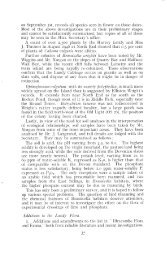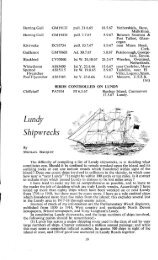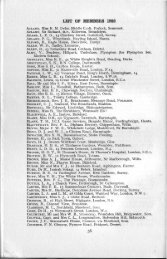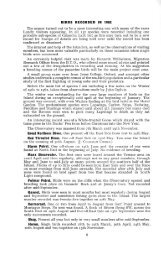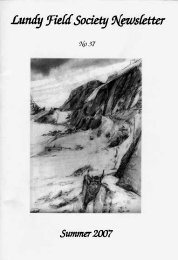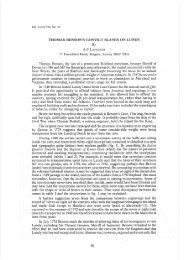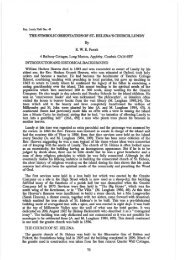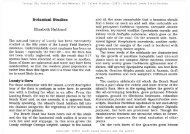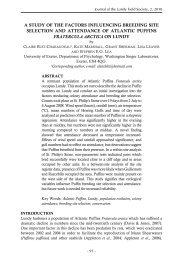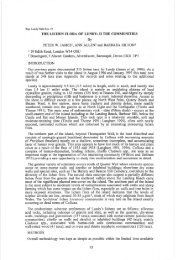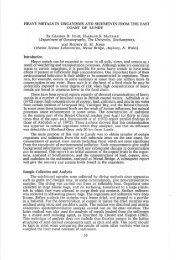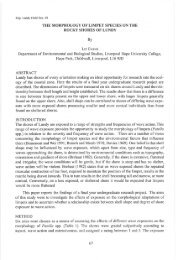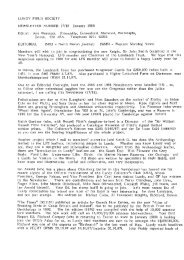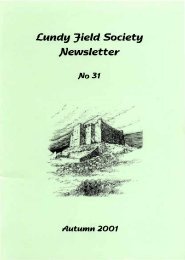You also want an ePaper? Increase the reach of your titles
YUMPU automatically turns print PDFs into web optimized ePapers that Google loves.
<strong>MARTIN</strong> <strong>COLES</strong> <strong>HARMAN</strong>The passing of Martin Coles Harman leaves a big gap in thelives of us who knew him. His was such a vital personality that itwas impossible to conceive of its light going out, and we are leftwith a feeling as of being in a room suddenly darkened. I wellremember my first, critical, correspondence with him in January1946. I wrote to an unknown to ask whether he would consider theidea of a group of naturalists going to his island in order to studyits natural history. His reply was only mildly encouraging, as wellit might be. But it was not actively discouraging, and upon mybeing able to reassure him that we had no designs on the ancientintegrity of <strong>Lundy</strong> I received a letter so generous and warm as toassure me that our about to be born society had a certain future.Among four conditions laid down, the second was, 'The saidCommittee to be formed at my suggestion herein made; I to be thefirst subscriber to its fund in the sum of £so hereby promised'.After that all was plain sailing ; a group of us interested in theidea met in Exeter and discussed ways and means, sent anexploratory expedition to <strong>Lundy</strong> in June, and by the end of thesummer the <strong>Lundy</strong> Field Society was in existence, born, throughMr Harman's vigour and vision, out of the Devon Bird-Watchingand Preservation Society. By the following spring we had beengiven free use of the Old Lighthouse, and were able to see our waytowards maintaining a warden in permanent charge. All this wasno light matter, particularly in those years immediately followingthe end· of the war, and it was due very largely to Mr Harman'sadvice, encouragement and help that we succeeded. From thattime onwards I, as Secretary, was to find him an everlasting sourceof delight and strength. Sometimes things happened which hedidn't like, and he wrote immediately to say so, but in terms whichcaused no offence but only the wish to put things right. That wealways arrived, swiftly, at an amicable conclusion was due in nosmall measure to his friendliness and his readiness to see a point ofview. At other times he was pleased with something, particularlywhen we obtained a new record for <strong>Lundy</strong>, and again he wrote tome immediately to say so.The debt which the Society owes to M. C. Harman is beyondtelling. But it is for his personal qualities that I at least shall misshim most. He had an inexhaustible store of impish vitality whichmade every letter from him, every meeting with him, an event.He seemed to have retained his youthful capacity for excitementand adventure, and it manifested itself in his jealous guardianship of,and pride in, his small kingdom under the shadow of the largerBritain. Those who have been privileged to meet him on the soilof <strong>Lundy</strong> will remember vividly how happy he was there, walkingthrough the bracken and heather to take stock of his Soay sheep,or deer, or golden orfe, calling at the Old Light to ask for news of4
irds passing through, shooting the deer to control their numbers,or the geese for Christmas dinners, or talking with knowledge andanimation on some point of <strong>Lundy</strong>'s history to some chance visitorin the bar of the Marisco. Always was he brimming with zest andpride in his realm. It was this which made <strong>Lundy</strong> so charming aplace ; for his benevolent autocracy brooked few of the restrictionswhich hem round our mainland lives. And so I shall always thinkof him as a king in his kingdom, proud and pleased when a Hoopoe,a Roller, a Golden Oriole or, better still, an American Robin tookbrief sanctuary within his shores.L. A. HARVEY.Born at Caterham-on-the-Hill, Surrey, Martin Coles Harmanwas the second child, and second son of William and FlorenceHarman, and one of eleven children. Though a successful and muchrespected builder, Mr William Harman could not afford to give hisnumerous children much in the way of 'treats' and so the familyfound their pleasure in the family circle, and in simple countrypursuits. They were a united and affectionate family, brought upin the strict principles of the late Victorian age. Martin and hiselder brother were educated at Whitgift Middle School, where bothwere regarded as clever and painstaking boys.Leaving school at 15 or r6 years of age, Martin found a placeas office boy in the great Foreign Banking firm of Lazard Brothersin Threadneedle Street, London. He was no clock watcher;intelligent and outstandingly quick at figures, and soon rose tojunior clerk, and at 24 years was head of the Stock Department.He showed astounding aptitude as a judge of the Stock Market,and went quickly from success to success.My family and the Harman family lived side by side for sixyears, and for close on eighteen years in the same village. We wereclose friends. We played together, we went to school together,that is I went to school with most of the younger members, andwe were in and out of each other's houses every day. When I wassix and Martin eleven, he invited me to go bird's nesting with him.He and his brother Terry were inveterate birds' nesters, but theynever took an egg if there were less than three in the nest. Martinremained an inveterate birds' nester to the day of his death. Iremember, during the last war, a pair of Mistle Thrushes built anest in the sycamore tree at the top of Millcombe Drive. Martinwas thrilled to the marrow. He could not resist climbing the tree atleast once a day, and handling the eggs. The result was the MistleThrushes deserted the nest, but, I am glad to say, built in a hawthornbush behind Millcombe House, and reared a brood of four.Martin Harman had-those qualities which make for greatness.His brain worked clearly. He had courage, resolution and immenseenergy. He was also patient, tolerant, simple and unaffected. His5
humility was quite astonishing in so successful a man. He wasalways prepared to believe that anybody and everybody knewmore about a certain thing than he did, even though it was patentthat Martin was a master in the subject under discussion.As his success in business steadily grew, he made it his businessto see that every member of his family had the opportunity toenjoy those things which circumstances had denied them in theirchildhood. Holidays at the seaside, holidays abroad, better schoolingfor the younger brothers and sisters, and a bigger house, with alarge garden for his father and mother. He forgot no one: uncles,aunts, cousins, and close friends, all were put in the way of makingtheir circumstances easier and more comfortable.It is not given to many men to realize their ambitions, butMartin Harman, after visiting <strong>Lundy</strong> when he was eighteen, foran afternoon, by a Campbell steamer, said to his friend, GeorgeRockett, 'One day I shall buy this island'. It was typical of theman that, having bought it, he did not want to keep it all to himself,he wanted as many people as possible to enjoy it with him. He neverlost interest in <strong>Lundy</strong>. He never wanted to 'develop' it, but hewanted to preserve its ancient status, and resisted, very successfully,any encroachment on its independence, rights and privileges by'officialdom'. He liked to think of it as a place where he, and allothers, could find all kinds of wild life, and that was what led himto introduce deer, goats, ponies, Soay sheep, brown hares, swans,geese, wild ducks, squirrels, Barbary sheep, partridges and wallabies,and to reintroduce gannets. He also made attempts to breed redgrouse and moorhens. For the benefit of those who have nevervisited <strong>Lundy</strong>, I must say that the introduction of brown hares,swans, wild ducks, squirrels, Barbary sheep, partridges, wallabies,red grouse and moorhens failed in a greater or lesser degree andthat the placing of gannets' eggs under shags produced no gannets.Martin Harman also spent a lot of money in trying to exterminatethe brown rat, and in planting trees and shrubs, as well as smallerplants, such as whortle-berry, which, incidentally, has not establisheditself.Visitors to <strong>Lundy</strong> now might be excused for thinking that theIsland had been 'let down' during Martin Harman's ownership,with the half ruined buildings, and general air of neglect, but, infact he has preserved the <strong>Lundy</strong> which matters, for his successorsand the large number of people in all parts of the United Kingdomwho have visited <strong>Lundy</strong> and fallen under its charm. He could soeasily have done otherwise.F. w. GADE.Although all my meetings with M. C. Harman were in Londonand mostly in or near the Law Courts, I always think of him inconnection with <strong>Lundy</strong>. He was to my mind not only a typical6
Englishman but a countryman and there is something about theIsland, rugged but at the same time mild, which exactly matchedhis character. Simple and unostentatious in the way he lived yetlavishly generous to those he liked, self-confident but withoutany self-conceit, with a love of nature and a capacity for friendshipwith people of every type and with a sense of humour which didnot spare himself, he was quite unlike the popular idea of animportant financier.When I first knew him he had, like almost everyone in the City,been struck by the terrible slump of twenty-five years ago and Iwas impressed by the courage, patience and cheerfulness with whichhe faced a long series of troubles and misfortunes and which enabledhim to a large extent to overcome them. Such qualities beinghereditary, I was not surprised to read that one of his sons hadbeen posthumously awarded the Victoria Cross. M.C.H. himselfgrew up in an era of peace in which a young man wishing to makehis way in the world naturally went into business, and I have sometimeswondered what his career might have been if he had adoptedsome profession which would have brought him more directly intocontact with the conflicts of the modern world and given him anopportunity of leading men, which would have come more naturallyto him than managing money.CECIL BINNEY.B 7



